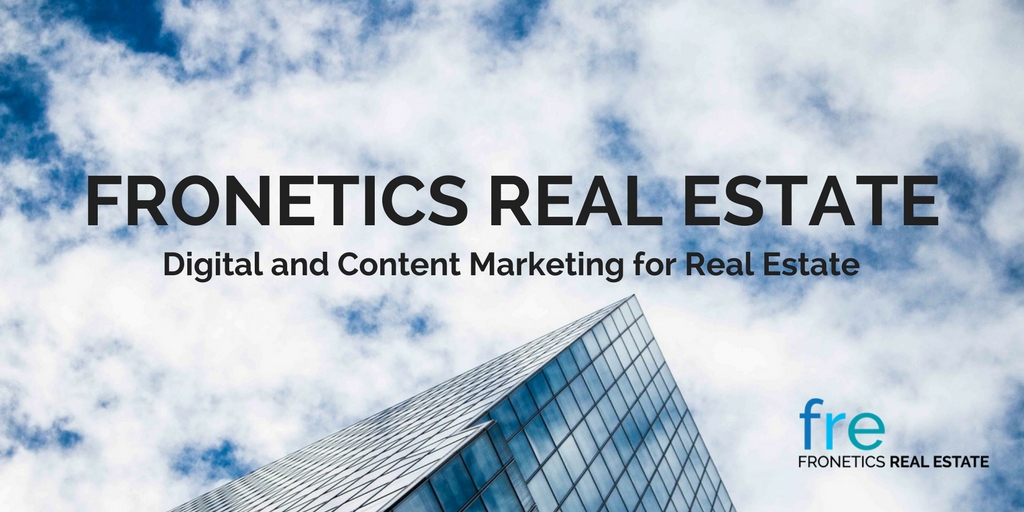Archive for the "Real Estate Marketing" Category

This Is the First Thing You Should Do in Real Estate Marketing
Without a documented strategy, your content marketing is doomed to fail.
Content marketing is one of the most effective ways to elevate your property’s reputation in the market, reach prospective buyers or tenants, and increase occupancy. Yet while many real estate marketers are using content marketing, not all feel their efforts are successful. Why do so many organizations feel they are failing? Simply put, they do not have a documented strategy in place.
You would never operate your business without 1) creating a strategy, 2) documenting it, and 3) following the strategy. Nor should you launch a marketing program without having a clear idea of what you want to accomplish and how you plan to do that.
A documented strategy = a successful strategy
A content marketing strategy outlines the methods by which you will target, reach, and engage your audience. Research and execution of these tasks can be quite complex. Writing out a plan and assigning appropriate resources can offer clarity and guidance to your organization throughout the course of your marketing efforts.
Also, remember that content marketing is more of a marathon than a sprint, and achieving results often takes months, even years. Documenting your strategy allows your team to keep focused on your goals and your plan for achieving them in the interim.
Here’s why you should take the time to draw up a plan and then write it down.
1) A documented content marketing strategy is more successful than an undocumented strategy or no strategy at all.
Research and analysis conducted by the Content Marketing Institute (CMI) reveals that only 27% of B2C marketers surveyed have a documented content marketing strategy. 50% of those surveyed said they had a strategy, it just isn’t written down. According to the CMI, “That’s a huge problem. If it’s not written down, then it probably doesn’t really exist.”
Because effective content marketing requires a team effort with a cohesive vision, having an undocumented strategy means you might as well not have a strategy at all. For everyone to be on the same page, it’s important to quantify goals, set a detailed plan, and document results.
2) A documented content marketing strategy helps measure ROI.
Many real estate companies struggle with content marketing or have trouble garnering support for the program because return on investment is notoriously difficult to measure. In fact, more than half of marketers say one of their top challenges is measuring content effectiveness (57%) and/or measuring the ROI of their content marketing program (52%).
Having a documented strategy in place gives your organization measurable goals against which to compare your results. Your strategy should:
- Document what you hope to achieve through content marketing — more leads, higher conversion rates, more social media followers, etc.
- Outline a specific methodology for executing those goals
- Assign human resources to each of the tasks
- Designate intervals at which to check in and evaluate/adjust your efforts
- Offer a timeframe for completion
Documenting your strategy in such a way clarifies where you are investing time and resources so that calculating ROI is less of an abstract process.
Related posts:
- The Metrics You Should Be Measuring in Real Estate Marketing
- 6 Marketing Tasks Real Estate Marketers Can Outsource
- Social Media Can Be a Strategic Weapon in Real Estate Marketing
Archive for the "Real Estate Marketing" Category

The Metrics You Should Be Measuring in Real Estate Marketing (Hint: Not Vanity Metrics)
Don’t waste your time reporting on vanity metrics, which won’t tell you whether you’ve achieved your ROI.
We all want to see the fruits of our labors. Whether renting a new property or launching a social media campaign, we look for instantaneous numbers that will affirm we made the right choices. But here’s the problem: not all metrics are created equal.
So-called vanity metrics are measurements that have no bearing on your bottom line but can give you an inflated sense of success. Generally, they are easy to calculate but are influenced by too many factors — and are too vulnerable to random external events — to be reliable.
Website visits and number of subscribers are two classic examples. A spike in homepage hits may be the result of your marketing efforts, or it may be because of ghost spam. (Or both.) Regardless, more visits do not necessarily correlate to increased revenue — just more visits. In the same vein, having 100,000 email subscribers means nothing if only 1% are opening them. You actually could be losing money in terms of resources allocated if the emails aren’t helping drive sales.
Investment vs. vanity metrics
That’s why it’s crucial to focus on return on investment instead of vanity metrics. You could waste hours reviewing a hundred different analytics that tell you nothing about how revenue was affected by a particular effort. Or, worse, you could use vanity metrics to justify decisions that don’t achieve their ROI.
As a simplified example: say you spend $1,000 on a display ad for a new apartment complex targeting established professionals on a local news website, and your analytics report that 100 people clicked through. This sounds like success! But don’t celebrate just yet. When you dig past the vanity metric, you find an extremely high bounce rate. That means most of those click-throughs left your site immediately, neither engaging with your property nor moving any closer to becoming a tenant. In fact, you find that only one click-through converts. Was it worth paying $1,000 for this one potential tenant? Probably not.
But say you ran another $1,000 display ad, one that targets a younger audience than you think your property fits. Only 20 visitors clicked through, which sounds less successful than the other ad. But when you follow those 20 click-throughs, you find that 5 ended up renting units, meaning the ad pays for itself many times over. You’ve also learned that perhaps a younger audience is more suited than you thought to your property. The ROI proves that the vanity metric was quite misleading in this case.
Metrics that help you make decisions
Lean-startup pioneer Eric Reis, who coined the term vanity metrics, said, “The only metrics that entrepreneurs should invest energy in collecting are those that help them make decisions.” In other words, measure the things that will tell you if an effort was profitable so you know where to put your time and money.
While vanity metrics tell you nothing about your bottom line, ROI can help you determine whether it was worth spending your resources in a particular way. This is extremely useful on platforms like blogs and social media, where things are constantly changing. Using ROI as a litmus test, you can keep experimenting and making sure you’re using these tools effectively. Tracking a vanity metric like number of followers, which is likely to build over time regardless, gives you no indication of which experiments were successful and which weren’t.
Your resources are limited, so it’s crucial to evaluate your efforts with meaningful numbers that illustrate their effect on your bottom line. Calculating ROI might take some time — both in the few extra minutes to do the math and the amount of time that needs to pass before all the data is available — but that number will be infinitely more valuable to you than any vanity metric on your Google Analytics report.
Related posts:
- Social Media Can Be a Strategic Weapon in Real Estate Marketing
- How Pay-Per-Click Helped This Property Get 54 Leads
- Learn How Content Marketing Increased Real Estate Sales by 37% in 90 Days
Archive for the "Real Estate Marketing" Category

4 Tools for Determining the Best Time to Post on Social Media for Your Property
Determine when and where your target buyers are online to find the optimal time to post on social media.
Social media has changed the landscape for doing business, particularly when it comes to real estate. With the click of a button, companies are able to instantly communicate with untapped markets and potential buyers and tenants. Face-to-face interactions are often overshadowed by live streaming videos, tweets, chats, and likes. For real estate sales and rentals, the possibilities for social media marketing are virtually endless.
But it’s not enough to curate content for your social media platforms. Today’s social media users expect fresh, innovative ideas around the clock. And when this content is being shared is just as valuable as what is being shared.
There’s a lot of research out there that highlights the optimal time to post on various social media platforms. For example, marketing analytics software provider TrackMaven has published its Best Times to Post on Social Media Cheat Sheet, which breaks down posting by industry, brand, and product. It also offers general dates and times that can boost success.
But the truth is, there is no one-size-fits-all social media posting solution.
You need to take it one step further. You need to know the best time for your unique property to post content. You want more than just a general idea of when to post. You want specific information about your target buyers and tenants — when they’re actively scrolling, reading, watching, and liking your content.
As you get a sense for when your target audience is most likely to interact with your content, be sure to keep in mind the ideal frequency for real estate companies to post to each social media platform.
Determining the best time to post on social media
There’s a broad range of tools available that will analyze the personal data of your social media followers and help you compute the best time to post on social media. Here are four that we think offer the most useful information and are easy to use.
1) Hootsuite
Hootsuite is a social media management tool that can do everything from scheduling social media posts to measuring your social media ROI. The AutoSchedule feature lets Hootsuite determine the best time to publish a post or tweet based on when similar content performed well in the past. It also considers the platform and can publish the same message at different times based on audience engagement on each particular network.
2) Tweriod
Tweriod, a free Twitter tool that helps you know the best time to tweet, is changing the way companies approach their marketing tweets. It will evaluate up to 1,000 of your followers and their tweeting patterns, including schedule, interests, and retweets. You then receive an analysis of when your tweets will receive the most exposure.
3) Google Analytics
Google Analytics is a robust analytical tool for determining how web users are interacting with your digital assets, including social media. Three custom reports (Best Days to Post on Social Media, Best Time to Post on Social Network by Hour, and the Social Media Traffic by Date and Hour) offer real-time, in-depth insight. Best of all, Google Analytics is free!
4) SproutSocial
SproutSocial offers a customized dashboard with a quick overview of how your social media channels are performing. You also can gain deeper insight into your customers — like gender and age demographics, crucial information for real estate marketing. And you can assess your customer reach and what will work in your favor.
Creating a strong social media presence is essential for any property. But having a presence is just a starting point in understanding how to fully optimize these ever-changing platforms to work for you.
Using online tools to analyze when and where your content should be posted will enhance the value of your social media efforts. In short, you have the best chance of generating leads and closing deals by pushing your content through the right avenues at the right time.
Related posts:
- 5 Tips for Building a Successful Real Estate Social Media Marketing Program
-
Social Media Can Be a Strategic Weapon in Real Estate Marketing
Archive for the "Real Estate Marketing" Category

6 Marketing Tasks Real Estate Marketers Can Outsource
Outsourcing doesn’t have to be a zero-sum game. Consider parsing off these marketing tasks based on internal resources and expertise.
Everyone needs a little help sometimes. That’s particularly true when it comes to real estate marketing. Real estate companies often find themselves stagnating in their marketing efforts as a result of having insufficient time, resources, and creative input to devote to marketing programs.
Outsourcing marketing allows you to focus on insourcing your core competencies, while delegating specialized tasks to external experts. And it’s important to note that you don’t have to outsource ALL of your marketing. Choosing several areas beyond your staff’s expertise or that are particularly time-consuming can help you improve your marketing efforts and take stress off an overworked internal marketing team.
So, here are 6 areas where you might consider outsourcing.
6 real estate marketing tasks to outsource
1) Website development and design
Sure, you could build a perfectly functional website from a template, or have your colleague’s techy niece put something together while interning with your company over summer break from college. But this is one area we feel strongly is best left to the pros.
A sleek, modern website that’s easy to navigate makes a big statement about your property. Potential buyers and tenants will visit property websites while researching and making purchasing decisions. The experiences they have while browsing contribute to their overall perception of the places. Imagine how poor site organization, outdated functionality, or technical problems reflects on your brand.
In addition to creating a well-functioning site, the right developer/designer brings niche specializations to the table as well, such as usability engineering, search engine optimization, and more. Capitalizing on a professional’s knowledge in these areas can make a big difference in web traffic, visitor engagement, and, ultimately, lead generation and increased revenue.
2) Social media management
Social media management sounds like it would be easy and fun. But if this task has ever fallen on your plate, you know the exact opposite is true. It can be one of the most time-consuming, frustrating tasks your business faces — and that’s before you realize you have to keep up with all the latest trends and platforms to be effective.
Outsourcing social media management to a knowledgeable partner can free up hours of your day and improve your social engagement and reach. These firms know what works and what doesn’t because they’re active every day on multiple platforms managing accounts for multiple clients.
And it’s not just posting every now and then. A good social media partner will craft and publish original content, but they’ll also curate great content from relevant sources. Outsourcing these tasks to the pros helps build a strong following and brand awareness for your company and properties.
3) Content creation
Blog posts, emails, case studies, white papers, ebooks, webinars, marketing collateral, newsletters — how much content is your staff responsible for creating on a weekly, even daily, basis? Is it the kind of informed, quality material you’re proud of?
Content creation is one of the easiest marketing tasks to outsource. It will immediately give your staff back hours into their days. And the right outsource partner will produce high-quality, SEO-optimized content that will drive traffic, generate buzz, and persuade buyers.
4) Videography, photography, and imagery
Video is the hottest content format right now. And it’s a huge opportunity for real estate marketers to show off properties to potential buyers across the globe. But shooting a professional-looking video or taking top-quality photographs of spaces is difficult, time-consuming, and expensive.
There are many firms and individuals that specialize in videography, and you’d be surprised how affordable and quick they can be. Or, some content creation partners also do video or can find a third-party videographer and manage the process for you.
A good content creation partner might also expand offerings to include photography, drone photography, and any other visual creative assets that might showcase your properties to prospective buyers or tenants.
5) Graphic design
This is one area where you really can’t fake it. Professional designers are worth their weight in gold, particularly when you need a professional document or graphic in a crunch. They can turn your documents into beautiful, easy-to-read brochures, or make dry, technical data into eye-catching infographics. You may be savvy with Word templates, but they’ve got nothing on the pro designers.
6) Strategy and execution
Did you know you can leave marketing strategy to the experts? The right partner will work closely with you to develop a strategy that closely aligns with your business and marketing goals. They can even execute the strategy for you, as well, and then provide you with regular updates on how it’s working. This kind of results-driven approach will ensure you’re stretching your marketing dollars to the fullest extent and getting the kind of results that will grow your bottom line.
Related posts:
-
Social Media Can Be a Strategic Weapon in Real Estate Marketing
-
6 Signs It’s Time to Consider Outsourcing Your Real Estate Marketing
Archive for the "Real Estate Marketing" Category

Good Real Estate Marketing Gets Personal
Personal, emotional marketing messaging is one of the most effective ways to reach prospective buyers, particularly when it comes to real estate.
Investing in real estate is one of the most momentous personal decisions a buyer will make. So it makes sense that real estate marketers need to connect with buyers on a personal level to be effective. But, really, marketing in all industries and sectors needs to “get personal” to move prospects to profitable customer action.
Modern marketing is moving away from what Tech Crunch calls the “impression-centric paradigm,” in which the cost of media drives a campaign. And it’s moving toward a “user-centric paradigm,” in which marketers fully consider the consumer at the point of contact with the product. That’s fancy jargon that essentially means that companies are learning as much about target buyers as possible, then figuring out what will draw the most emotion from a person with that particular profile.
What information does your organization have about potential buyers? What information can you draw from social media (social prospecting)? Bring the two together, and begin crafting messaging for that persona. That’s pretty potent stuff.
The personal story
Particularly with buyers in the digital space, personalized, emotional messages attract the most attention. Think about messages that stuck out to you last time you browsed social media or various news and media outlets. My guess is that they touched you on a personal level.
To foster a connection with potential buyers through marketing, real estate marketers should use this knowledge to their advantage. Get personal with your messaging and creative. Real estate marketing lends itself to this kind of narrative — places can have powerful, engaging stories that can capture the hearts and imaginations of prospects.
Friends and neighbors
Emotional, personal narratives aren’t the only ways to reach potential buyers. One of the most important sources of spreading real estate brand awareness is peer-to-peer recommendation. Staying engaged with your social media audiences — and the conversation surrounding your brand and properties — is a great way to encourage this kind of referral.
After all, social platforms are at heart networks, meaning that any interaction you have with a follower will be seen by that person’s network. Show that you’re not some faceless building or property. If you can foster positive personal relationships with followers on social media, their networks will bear witness. And they’ll be left with a positive impression of your properties and brand.
Real estate is ideal for personal marketing. Know your buyers and tenants, and start to get personal. You’re sure to see results.
Related posts:
-
Social Media Can Be a Strategic Weapon in Real Estate Marketing
-
When Traditional Real Estate Marketing Methods Stop Working, Try Digital Marketing
-
Learn How Content Marketing Increased Real Estate Sales by 37% in 90 Days
Archive for the "Real Estate Marketing" Category

Announcing Fronetics Real Estate’s Official Launch
Fronetics Real Estate brings digital and content marketing expertise to residential and commercial real estate clients.
It’s a big day for Fronetics! We’re officially launching our new brand, Fronetics Real Estate (FRE), offering digital and content marketing services to residential and commercial real estate clients.
Over the last two decades, real estate has seen a major shift in buyer behavior, with buyers now conducting the majority of their research online. Content marketing is an approach that puts real estate marketers in charge of the way prospective buyers and tenants perceive and interact with their properties. The strategic creation and distribution of content helps properties:
- Build brand awareness
- Generate prospects
- Lower cost per lead
- Increase occupancy
- Drive sales
- Improve retention
As content marketing experts, Fronetics Real Estate is uniquely positioned in the real estate industry. Firstly, we have a proven history of success with content marketing for real estate. Our clients benefit from having a dedicated account team that works exclusively with real estate clients — they know how to help them succeed.
Secondly, our approach is unique in that it starts with data and ends with measurable results. We design and execute a strategy that aligns with your business objectives. That way, our clients see movement where it matters: lower cost per lead, higher occupancy, and faster sales.
Real estate marketing services
Fronetics Real Estate’s portfolio of digital and content marketing services includes:
- Content marketing: strategy development, content creation, and execution
- Social media: strategy, management, distribution, advertising
- Email marketing: templates, marketing emails, workflows, and newsletters
- Website development: branding, design, maintenance, and content creation
- Paid advertising: pay-per-click and social media advertising
- Sales enablement: reporting and analysis, sales content optimization, automation
Whether you have luxury condominiums, for-rent apartments, a planned community, commercial properties, or mixed-use/retail space, we would love to show you about how Fronetics Real Estate can help you reach today’s prospective buyers and tenants. Schedule a free competitive analysis, subscribe to our blog, or contact us for more information.
Read the official press release.
Related posts:




